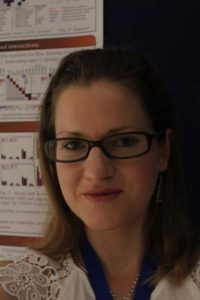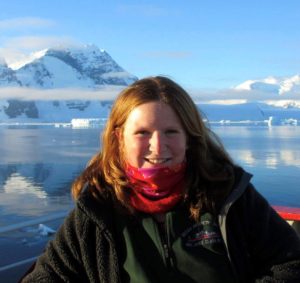Dr Freya Garry graduated from the University of Southampton in 2013 with best in class for Master of Science in Oceanography. She remained based at the National Oceanography Centre Southampton for her doctorate, co-sponsored by the Met Office, during which she researched deep ocean heat content and how it is observed. In January 2017, she became a researcher in the Department of Geography at the University of Exeter, where she studies Atlantic Ocean climate over the last millennium.
Twitter: @freyagarry
 Dr Penelope Maher is a climate scientist specialising in convection and large-scale circulation of the atmosphere. She is an early career scientist from Australia who joined Exeter’s mathematics department in 2015.
Dr Penelope Maher is a climate scientist specialising in convection and large-scale circulation of the atmosphere. She is an early career scientist from Australia who joined Exeter’s mathematics department in 2015.
Despite many STEM undergraduate and postgraduate degrees having a reasonable gender balance, there is a rapid loss of women in STEM subjects post-PhD. In particular, there are significantly less senior women in climate science. Post-doc and lecturer positions frequently demands mobility which is often harder for women. Additionally, women are more likely to may take career breaks for their children.
Mentoring relationships can be hard to retain and informal mentoring is not as common for women, who are less likely to be taken to the pub by their senior colleagues for example. Generally, women will delay applying for promotion until the meet every criteria rather than just ‘giving it a go’. Perhaps this is also true in applying for grant funding. Typically women find failure more difficult. There is evidence of unconscious bias in recruitment against female applicants. In addition, there is evidence that women leave male dominated professions (regardless of age) after a few years because of lack of senior role models. Of course all of these points are generalisations and not all women will relate; equally, those with other gender identities may relate to these points.
The name of our network, Women in Climate, reflects the gender imbalance that exists amongst academics in climate science. The aim of the network is to support the retention of women in climate science and promote diversity in all areas. We hope to achieve this aim by hosting events and discussion groups to try and address some one issues listed above. Therefore our events are open to all genders and we hope the topics for discussion will benefit anyone who feels disadvantaged in academia. We encourage senior staff to attend as well as early career researchers; senior staff can share personal experiences and opinions and network with their younger colleagues.
The core event of the network are monthly meeting on a Friday afternoon. These events have free snacks and refreshments! We use these events to meet new people, to network and to discuss a diverse range of subjects. Some of these might be discipline specific, and some very general. We typically ask relevant climate scientists or subject specific experts (e.g. we asked psychologists to come talk to us about the ‘imposter’ phenomena) to help lead the discussion and offer experiences/opinions that can frame open discussion.
The relaxed atmosphere, where we can talk freely with our colleagues, is a positive step in building a positive work place culture where we (a) don’t feel alone in struggles associated with the academia life, (b) can share experiences and ideas for coping with some of the things we find hardest about academic life and (c) promote diversity and the ideal of treating colleagues as individuals regardless of gender (or race, or sexual identity).
Organising such events on a smaller local scale (ie similar research interests, in our case the climate) by colleagues you know and where everyone can help shape the meetings, seems to be a recipe for success. We hope to organise numerous one-off events over the coming year to provide specific skills training and bigger networking events, in addition to maintaining our monthly meetings. There is no doubt that this comes at significant time cost to the organisers, but we feel the benefits already only a few months in and have received good feedback. We would encourage others in setting up similar within their own departments or subject areas.

